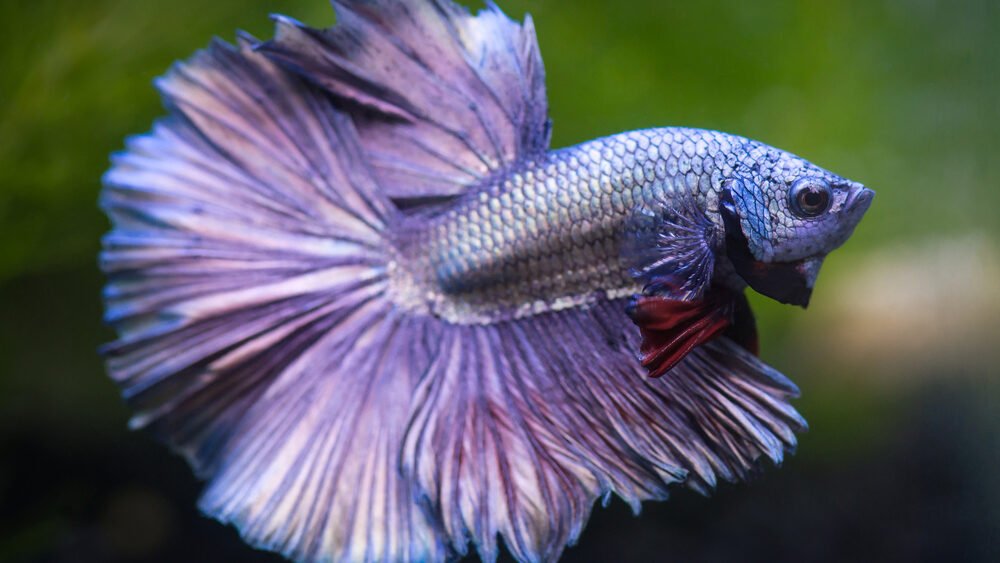Betta Fish Facts, Habitat, Care Tips & Siamese Fighting Fish FAQ
Are you ready to have your mind blown by the most unique, delightful, absurd, and exciting facts about betta fish? Get ready to be entertained and educated as we dive into the beautiful world of these fabulous creatures! From their unique behaviors and quirks to their vibrant colors and mesmerizing displays, bettas are a joy to behold. And when you think you’ve learned everything there is to know about these amazing animals, you’ll discover a whole new level of absurdity that will leave you amazed. So come on this journey with us, and get ready to have your mind expanded and your heart warmed by the exciting world of Siamese fighting fish.
Betta Fish Facts (Quick & Interesting Fun Facts)

Here are some betta fish facts:
- Wild betta fish look different: often green-brown and dull
- Betta’s natural habitat is rice paddies.
- Males bettas build bubble nests on the surface of the water for the female to lay eggs in (read how bettas breed)
- Males protect the eggs’ nest.
- They are territorial and aggressive (so choose your tank mates carefully)
- They are incredibly intelligent fish (you can train them to do jumping tricks)
- Betta fish can breathe air through an organ called a labyrinth.
- There are 73 species of betta fish.
- People call them Siamese fighting fish because they originate from Thailand (formerly Siam) and due to their aggressive nature.
- They are one of the most popular fish species in home aquariums worldwide.
- They can sense vibrations with lateral lines
- They can rest on leaf hammocks or the tank floor but don’t sleep like humans.
- They can survive without filters and air pumps if water conditions are kept excellent.
- Bettas are cold-blooded (literally and figuratively) and may need a heater.
- They can get fin rot from poor water quality or fighting wounds.
- Male and female betta fish can’t live together in the same tank.
What is a Betta? There are more than 70 species of betta

Betta fish, or betta splendens, also known as Siamese fighting fish, are freshwater fish native to Southeast Asia. They are known for their bright colors, long flowing fins, and, as their name suggests, their tendency to engage in territorial behavior and even fight with other male bettas. But don’t let their feisty reputation fool you – bettas can also be relatively peaceful and even social, depending on their surroundings and the company they keep.
There are many different types and varieties of bettas, each with unique physical characteristics and colors. From the stunningly iridescent half-moon betta with its flowing, circular fins to the delicate and dainty crown tail betta with its elegant frilled fins, there is a betta out there to suit every taste and preference.
Betta Splendens Behavior

Betta fish are known for their elaborate courtship displays, in which the males flare their fins and gills and even build bubble nests to attract a mate. But beware – male bettas can also be quite territorial and may become aggressive toward other males, female bettas, or even their own reflection (they’re pretty funny too).
In a correctly set up tank or enclosure, however, bettas can coexist peacefully with other tankmates. They may even form social bonds with their owners and become interactive and playful. It’s essential to understand your betta’s personality and behavior and to provide a suitable environment that allows them to thrive and express their natural behaviors.
Betta Fish Habitat and Predators

In the wild, bettas live in various freshwater habitats, including rice paddies, marshes, and even the slow-moving streams of Southeast Asia, especially Thailand. Thailand’s former name was Siam, which is why people call it Siamese fighting fish. In captivity, it’s important to replicate a similar environment for your betta, with plenty of hiding spots, plants, and other enriching elements to explore.
Betta tanks and enclosures come in all shapes and sizes, from small bowls to large, elaborate setups. It’s essential to choose the right size and type of housing for your betta, considering their size, behavior, and the number of tankmates they may have.
While bettas are known for surviving in low-oxygen environments, it’s still essential to maintain good water quality and provide a filter to keep the water clean and healthy. And remember to include plenty of live or artificial plants, as bettas love to explore and play among the greenery.
In the wild, bettas prefer rice paddies with a smaller chance of becoming prey to larger fish. The rice paddies are the perfect habitat as the water is shallow, and there are plenty of hiding places to protect them from potential predators, such as larger fish from the rivers and canals, lizards, and salamanders.
Betta Diet and Prey

In the wild, bettas are carnivorous and feed on a variety of small prey, such as insects, worms, and even small fish. In captivity, a varied diet of high-quality flakes or pellets, supplemented with occasional treats such as frozen or live brine shrimp, can help keep your betta healthy and happy.
Feed your betta a balanced diet and do not overfeed them, as bettas are prone to obesity and other health issues if they consume too much food. Also, the food not eaten ends up as waste and makes the fish tank dirty. It’s also a good idea to vary their diet and offer various types of food to keep them interested and prevent boredom. Buy some betta food from the pet store.
Frequently Asked Questions about Bettas
Do betta fish have ears?

No, bettas do not have visible ears like humans or other animals. However, they have a system of lateral lines in their scales that allow them to sense vibrations and movement in the water.
Do betta fish have tongues?
Yes, bettas have a small, protrusible mouthpart called a labyrinth organ that functions as a tongue. They use this organ for breathing air from the surface and tasting and manipulating food.
How to catch a betta fish?

It is generally not recommended to try and catch a betta fish by hand, as this can cause stress and injury to the fish. Instead, gently use a small net or cup to scoop them out of the community tank.
Do betta fish use leaf hammocks?
Some bettas may enjoy resting on or playing with a leaf hammock, but it is not a necessary part of their care. Providing plenty of hiding spots and surfaces for your betta to rest on is essential, but a leaf hammock is optional.
Do betta fish require a filter?

It is optional for bettas to have a filter, as they can survive without one if the water is changed frequently and water conditions stay good. However, a filter can help maintain a clean and healthy water environment and improve the overall well-being of your betta.
Are betta fish cold-blooded?
Yes, bettas are ectothermic, meaning the environment regulates their body temperature, so they are often kept in tanks or enclosures with a heater to maintain a suitable temperature.
Where do betta fish like to sleep?

Bettas do not sleep like humans, as they do not experience REM sleep. However, they do rest, and you may see them chilling at the bottom of the tank, on a leaf or other surface, or even floating near the top of the water.
How do betta fish lay eggs?
During breeding, male bettas construct a bubble nest and attract a female betta to lay her eggs. The male betta fish will fertilize the eggs and care for them until they hatch.
How do betta fish get fin rot?

Poor water quality or injuries from fighting can cause fin rot. The best way to prevent fin rot is to maintain clean water and avoid overcrowding, stress, and conflict by separating aggressive fish with tank dividers or multiple tanks.
Conclusion
Bettas are amazing animals, so hopefully, you will take care of them well. Create a suitable habitat in your betta fish tank, feed them a balanced diet, and give them plenty of love and care, and they will love you back and keep you company for years. We hope you found the surprising betta fish facts helpful.

